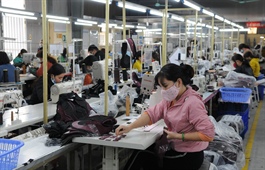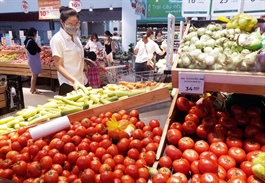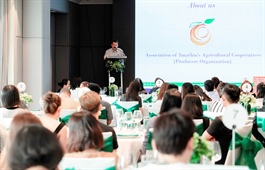Investing in processing needed to increase farm produce value
Investing in processing needed to increase farm produce value
Investing in processing technology is important to diversify products and increase farm produce's added value and promote exports, experts have said.

According to Ngo Quang Tu from the Agro Processing and Market Development Authority, there are 157 processing facilities with a total output of nearly 1.1 million tonnes per year.
However, these facilities usually operate at around 60 per cent of their designed capacity due to a shortage of raw materials as plantations remained scattered, coupled with seasonal processing and unstable food safety and quality.
There were also thousands of small-and-micro-sized processing establishments of cooperatives and households across the country, which were faced with a shortage of capital, production space, lack of equipment and poor post-harvest storage, resulting in post-harvest losses of more than 20 per cent.
Regarding the proportion of processed products, canned food accounted for 50 per cent, condensed juice 18 per cent, fried food 12 per cent, soft drinks 10 per cent and frozen 8 per cent.
Processed products contributed only 18 per cent of the total export value of vegetables and fruit.
Tu said it was necessary to reorganise raw material production and enhance regional linkage to ensure enough supply and quality of raw materials for processing.
While most processing facilities were small-scale, Pham Anh Tuan, Director of the Viet Nam Institute of Agricultural Engineering and Post-Harvest Technology, stressed the need for developing modern processing technologies suitable for small-and-medium-scale operations.
Products suitable for small and medium scales were fresh, dried, frozen and canned vegetables and fruits.
Tuan said that small and medium-sized processing facilities should invest more in technology to meet the demand for diversifying products.
However, they must pay attention to selecting appropriate technologies for their operation scales, source of materials and target markets.
Tran Van Cong, Viet Nam's Agricultural Counselor in the EU, said that the EU was a significant and potential export market for Viet Nam's agricultural products, in which fruits and vegetables had the largest room to expand.
He said EU markets imported vegetables and fruits worth around US$120 billion each year, accounting for 40 per cent of the total global import and export value of fruits and vegetables.
However, Viet Nam's fruit and vegetable export to the EU remained modest, around $190 million, 30 per cent of which were processed.
Cong noted that the EU was a highly demanding market, urging attention to food hygiene and safety.
Updating on sanitary and phytosanitary (SPS) measures, Ngo Xuan Nam, Deputy Director of the Vietnam Sanitary and Phytosanitary Notification Authority and Enquiry Point, said that WTO member countries had 504 notifications in the first half of this year, 9 per cent higher than last year.
Nam said that businesses must control the maximum residue levels, urging attention to declaring additives in processing.
Phan Thi Thu Hien from the Plant Protection Department said each market had specific requirements for different agricultural products. For example, the US required fresh fruits to be irradiated, while Korea and Japan required hot stream treatment.
Cooperatives and farmers needed to coordinate with State management agencies to closely monitor the plantation and processing to meet such requirements.
























